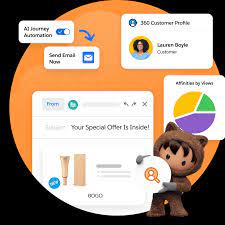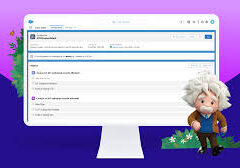Salesforce Marketing Cloud Personalization, formerly Interaction Studio, offers incredible power for personalization. MC Personalization Tips and Tricks below will help you level up your game.
Einstein Recipes: Enhancements and Challenges
Multiple Dimensional Variations for Products in Einstein Recipes
Einstein Recipes offer powerful and flexible tools for creating recommendations. However, the fourth step, Variations, falls short compared to other options. Currently, you can configure only a single Dimensional Variation. While multiple Item Types are available, once you select one, you cannot limit recommended products to specific numbers per category or brand. This limitation hinders control over product recommendations, especially for e-commerce sites with diverse catalogs. Unlike Dimensional Variations, multiple Boosters or Exclusions of the same type can be configured differently, which would be a valuable feature to add for Variations.
Department Variation for Products in Einstein Recipes
Einstein Recipes allow Dimensional Variations at the Category level, but only for primary categories. There is no option for Department (master category) level, which is limiting for e-commerce sites with broad category trees, such as:
- Monitors (gaming, graphic, office, medical)
- Computers (laptops, ultrabooks, convertibles, desktops, all-in-ones)
- Saddles (english, western, endurance, treeless)
Recommendations with Category Variation set can still be dominated by similar products due to similar primary categories. Two solutions could address this:
- Add Department as an option in the Item Type dropdown.
- Add a checkbox to select whether Variation should occur at the primary Category or Department level.
Price Reduction Ingredient in Einstein Recipes
Triggered Campaigns in Journey Builder can target various events, including Catalog Triggers. Some triggers, like Product Expiring Soon, are available for Web with Einstein Recipes Ingredients. However, there is no Ingredient for the common e-commerce use case of Price Reduction. Marketing Cloud Personalization (Interaction Studio) has the required price and listPrice attributes for Triggered Campaigns. A workaround involves calculating price reductions externally and passing this information to a Related Catalog Object. More efficient solutions would be:
- A simple ingredient that returns all price-reduced items, similar to Trending.
- A configurable ingredient with an option to select the minimum price reduction percent, possibly with a Recipe Booster on the reduction percent.
Rating Count in Recipe’s Rating Exclusion
Marketing Cloud Personalization offers Exclusions/Inclusions on Recipes to fine-tune recommendations. One option is to exclude/include items based on their rating, with an optional zero rating capture. It would be beneficial to include an option to filter based on rating count, allowing for:
- Including only products with great ratings and at least 10 ratings.
- Excluding products with bad ratings if they have more than 3 ratings.
- Including products user purchased with fewer than 3 ratings for review-request campaigns.
Currently, such filters can only be applied on the server side in the Template, which can limit recommendations. Having this feature at the recipe level would be more powerful.
Abandoned Cart Retention Setting
Marketing Cloud Personalization captures cart information for Einstein Recipes recommendations. However, cart content remains indefinitely unless managed proactively. A workaround involves a Web Campaign that checks cart age and pushes a clear cart action if necessary. A better solution would be a configurable option in MCP settings to automatically remove old cart data.
Catalog Enhancements
Full MCP Category Hierarchy Support for ETL
Marketing Cloud Personalization can create a hierarchical tree of categories with automatic summing of views and revenue. However, this is currently possible only under specific conditions, such as having one Category per product and using a Sitemap format. This limitation is problematic, as ETL is often a better way to manage it. The Category ETL already provides detailed information using department and parentCategoryId attributes, but this data does not replicate the drill-down hierarchy in the Catalog UI or pass data from the bottom Category up. Ensuring feature parity between Sitemap and ETL would be beneficial.
Segmentation Enhancements
MCP Action Name Management
Marketing Cloud Personalization captures actions from multiple sources but does not allow managing created actions. An option to view and remove unnecessary actions would improve user experience by reducing the number of options in the segmentation/targeting picklists. An even better solution would be to merge existing actions, preserving behavioral data after refactoring action names.
MCP Hourly-Based Segmentation Rules
Currently, segmentation rules in Marketing Cloud Personalization are based on days, limiting on-site campaign targeting. For example, to display an infobar for abandoned cart users, the current segmentation can only show users who have not performed a Cart Action today. Hourly-based segmentation rules would allow more precise targeting, showing users who have not performed a Cart Action in the last hour. Adding a picklist to choose between day or hour-based rules would enhance segmentation capabilities.
Full MCP Catalog Export
Marketing Cloud Personalization supports manual catalog export but only with limited data. The current export file lacks complete catalog data (e.g., promotable and archived attributes), making it unsuitable for ETL sources. An option to export the full catalog data, matching the ETL schema and including hidden items, would greatly benefit debugging and batch-modifying items for subsequent ETL import.
Full MCP Catalog Metadata Visibility
Marketing Cloud Personalization supports viewing custom attribute metadata in the Catalog but is limited to ETL updates. Extending this to built-in attributes and including origin and lastUpdated values for all sources (Sitemap, Mobile App, Manual update, API) would simplify debugging Catalog metadata issues, reducing admin/developer work and support tickets.
ETL Enhancements
External Email Campaign ETL Experience Name & ID
External Email Campaign ETL allows passing behavioral data but is limited to Campaign ID and Campaign Name. To fully leverage this data in segmentation, it should also support Email ID and Email Name. Adding Experience ID and Experience Name fields to the ETL would enable targeted personalization, allowing segmentation on entire campaigns or specific emails within campaigns.
External Email Campaign ETL Send Segmentation
External Email Campaign ETL passes Send, Click, and Open data but does not support segmentation based on Send events. Enabling segmentation rules for Send events would unlock use cases like targeting Web or Push campaigns to users who received an email campaign but did not open it, fully leveraging cross-channel and real-time personalization.
External Email Campaign ETL Unsubscription Event Type
External Email Campaign ETL passes Send, Click, and Open data but cannot pass unsubscriptions. Including the Unsubscribe event would enable targeted campaigns like surveys about unsubscription reasons, win-back campaigns, or replacing email subscription prompts with other channel recommendations.
By addressing these enhancements and challenges, Salesforce Marketing Cloud Personalization (Interaction Studio) can further improve its capabilities and provide more precise, effective, and user-friendly tools for personalized marketing.
Reporting Enhancements: Direct Attribution at the MCP Campaign Level
Current Reporting in Marketing Cloud Personalization (MCP)
Marketing Cloud Personalization (Interaction Studio) offers various reports based on Activity, Results, and Visits. However, it lacks clear and detailed reporting on direct attribution from specific campaigns.
Currently, attribution tracking is available in two places:
- Main Dashboard (MCP Home Page):
- Displays the Total Stats and Revenue Dashboard at the top.
- Showcases direct revenue from campaigns, where the user clicks a product recommendation and purchases that specific promoted item within a selected timeframe.
- Does not offer per campaign (and per experience) data, only a global value split between all Web Recommendations and all Email Recommendations (OTE).
- Specific Campaign Statistics:
- Displays detailed statistics for each experience.
- Does not offer direct attribution.
- Allows selection of attribution based on click or view and setting the attribution window.
- Attribution based on views means if a user viewed a campaign and purchased anything (even unrelated to the campaign recommendation) within the specified timeframe, it is treated as revenue from that campaign.
- Attribution based on clicks means if the user clicks on the campaign (e.g., on a Laptop recommendation) and makes any purchase (e.g., a new Monitor and cable), the entire revenue is attributed to the campaign.
- While acceptable for product-less campaigns (like Infobar) where direct attribution might not be possible, it is not useful for meaningful analysis of recommendation conversions.
Current Challenges
There is no effective workaround for this problem. The Data Warehouse does not provide a solution. The only current method is to append Campaign & Experience IDs to all links in the campaigns and move the calculation to an external analytics system. This approach is complex and results in a subpar experience compared to having reports directly in the system that deploys the campaigns and tracks purchases.
Proposed Solution
There should be an additional option in the Campaign Statistics that displays attribution with the same logic as the Main Dashboard but with per-experience detail. This enhancement would provide a clear and detailed view of direct attribution from specific campaigns, enabling more meaningful analysis and better decision-making.
By implementing this feature, Marketing Cloud Personalization can offer comprehensive reporting that aligns with the needs of businesses, providing a more accurate and user-friendly experience.













